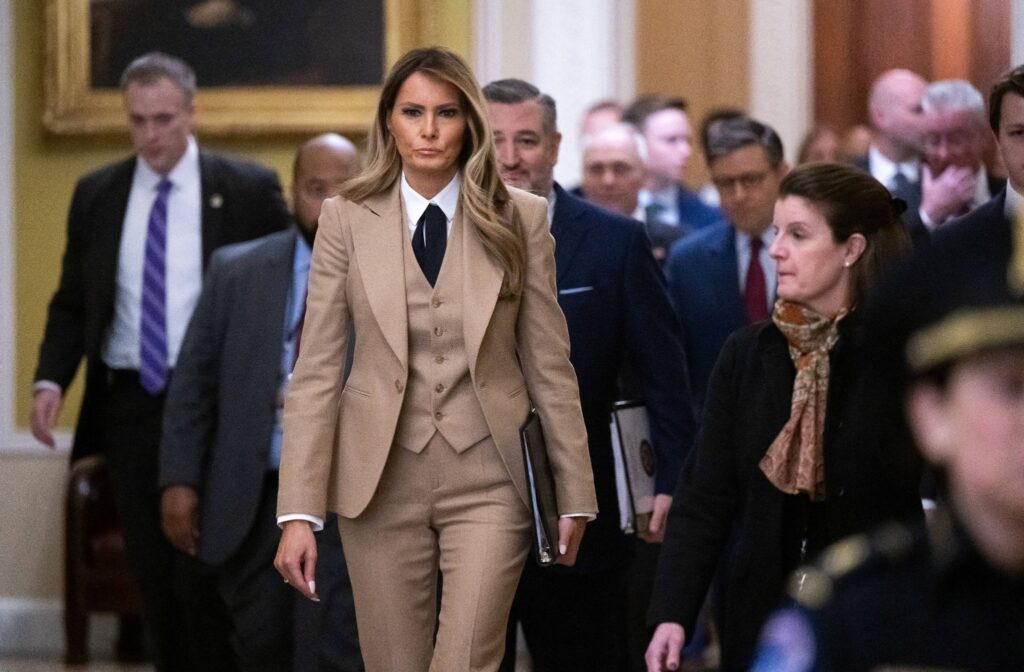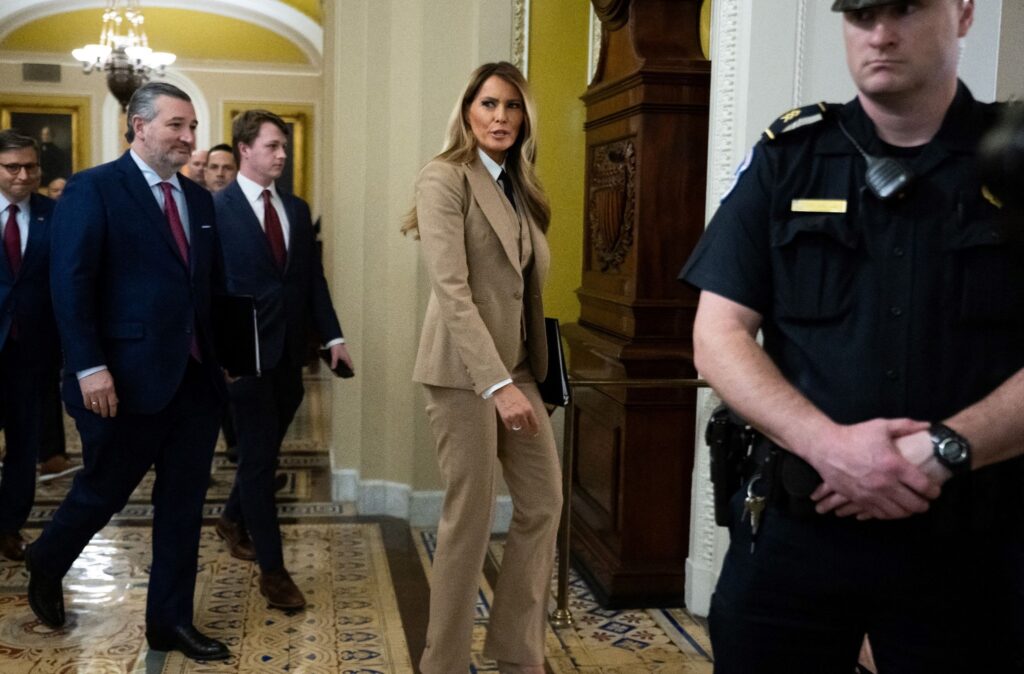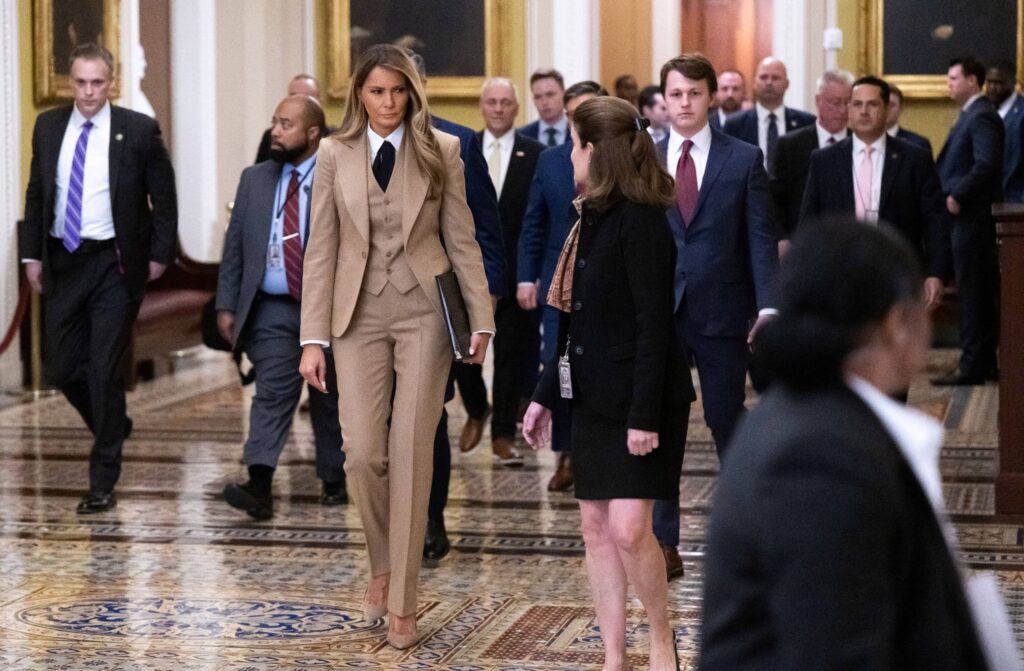
The Fight for Online Safety: Melania Trump Call to Action
In a digital world where online safety is increasingly under threat, First Lady Melania Trump has taken a strong stance to protect children and young individuals from harmful content and cyber exploitation. In a recent address, she advocated for the passage of the Take It Down Act, a bill aimed at preventing the spread of non-consensual intimate images, particularly deepfake content that victimizes young people. Her speech highlighted the urgency of addressing online abuses and holding social media platforms accountable.
As the internet continues to evolve, so do the dangers associated with it. The rise of deepfake technology has made it easier for predators and cybercriminals to exploit minors, leaving them vulnerable to online abuse. The Take It Down Act is a critical step toward ensuring that children and young adults have a safe digital space where they are not at risk of being victimized by malicious actors. This legislation is not just about policy—it is about protecting the dignity, mental health, and future of millions of young people worldwide.
The Growing Threat of AI-Generated Harm

The rise of artificial intelligence has brought incredible advancements, but it has also enabled a new form of abuse—deepfake technology. This technology allows malicious individuals to create realistic yet fabricated intimate images of victims, often using the faces of minors without their consent. The emotional and psychological toll on victims is devastating, as they are left helpless while their manipulated images circulate online.
One such victim, 15-year-old Allison Barry, shared her horrifying experience of having her face superimposed onto inappropriate content that spread across social media. Her family’s repeated attempts to have these images removed were ignored, demonstrating a disturbing lack of accountability from tech companies. Her story is just one of many, underscoring the pressing need for legislative action.
Beyond individual victims, the unchecked spread of deepfake technology presents a broader societal issue. The ability to create and distribute false but highly convincing images can lead to blackmail, harassment, and psychological trauma. While some argue that AI-generated content has legitimate creative uses, the risks far outweigh the benefits when it comes to the exploitation of minors.
Melania Trump Advocacy and the Take It Down Act
Melania Trump’s Be Best initiative has long emphasized the importance of children’s well-being, including online safety. In her speech, she called for bipartisan support of the Take It Down Act, urging Congress to move beyond political divisions and focus on protecting vulnerable youth.
The Take It Down Act aims to:
- Mandate social media platforms to remove explicit deepfake content within 48 hours of a victim’s request.
- Hold tech companies accountable for failing to act against harmful, non-consensual images.
- Establish harsher penalties for perpetrators who create and distribute such content.
- Develop new guidelines and monitoring systems to prevent the widespread abuse of AI-generated images.
First Lady Melania Trump highlighted that the bill is not just about punishing offenders but about preventing harm before it occurs. By requiring platforms to proactively monitor and swiftly remove harmful content, the legislation seeks to create an online environment where young people can engage without fear of exploitation.
Bipartisan Support and Political Challenges

While the bill has gained backing from both Republican and Democratic lawmakers, Melania Trump noted her disappointment in the lack of more Democratic leaders present at the event. However, she expressed optimism that online safety is an issue that transcends party lines, emphasizing that the well-being of children should be a top priority for all legislators.
Senators Ted Cruz and Amy Klobuchar, as well as Representatives Maria Salazar and Speaker Mike Johnson, have shown strong support for the bill. They argue that Big Tech companies have operated without enough accountability and that this law would be a crucial step in enforcing responsibility.
However, passing the bill remains a challenge. Some critics argue that requiring tech companies to remove content within 48 hours could lead to unintended censorship issues, while others worry about the enforceability of such measures. Despite these concerns, the overwhelming consensus is that something must be done to protect minors from the dangers of AI-generated content.
The Responsibility of Social Media Platforms
A key point in Melania Trump’s speech was the failure of major social media companies to respond swiftly to reports of deepfake abuse. Many victims, including Allison Barry, have found that platforms either ignore their complaints or take months to remove harmful content. This inaction enables perpetrators to continue their abuse while victims suffer ongoing humiliation.
Under the Take It Down Act, companies like Snapchat, Instagram, and TikTok would be legally required to act within 48 hours, significantly reducing the time harmful content remains online. Additionally, the bill proposes stronger regulations to prevent the creation and distribution of deepfake technology for exploitative purposes.
Tech companies argue that monitoring and removing content at such a rapid pace is challenging. However, advocates insist that these platforms already have advanced AI tools capable of identifying and flagging inappropriate content. The issue, they say, is not technological capability but corporate priorities—many platforms prioritize profit over user safety.
Melania Trump Call for Urgent Action

Melania Trump’s passionate appeal has reignited the conversation around online safety and digital responsibility. She praised the courage of victims who have spoken out and urged lawmakers to act swiftly in passing the Take It Down Act.
Beyond government intervention, Trump emphasized the role of parents and educators in fostering online safety. She encouraged parents to have open conversations with their children about digital risks, emphasizing that prevention starts at home.
Her advocacy serves as a powerful reminder that protecting children in the digital age requires a collective effort—from government officials, social media companies, parents, and society as a whole. If enacted, the Take It Down Act could mark a significant step toward creating a safer online environment for future generations.
The internet has revolutionized the way people connect, learn, and share information, but it has also opened the door to new forms of exploitation. As deepfake technology becomes more advanced, so do the risks associated with its misuse. Melania Trump’s advocacy for the Take It Down Act highlights the urgent need to establish clear legal protections for young individuals who fall victim to digital abuse.
While legislative battles remain, the overwhelming support for online safety reform suggests that change is coming. As more victims speak out and awareness grows, lawmakers must act decisively to ensure that the digital world does not become a breeding ground for exploitation.
Ultimately, the success of the Take It Down Act will depend on continued pressure from the public, policymakers, and digital rights activists. If the bill passes, it will set a precedent for how societies handle AI-generated threats, potentially influencing international policies on online safety.
In the fight to protect children from cyber exploitation, inaction is not an option. It is time for the government, tech companies, and communities to take decisive action and make the internet a safer place for everyone.